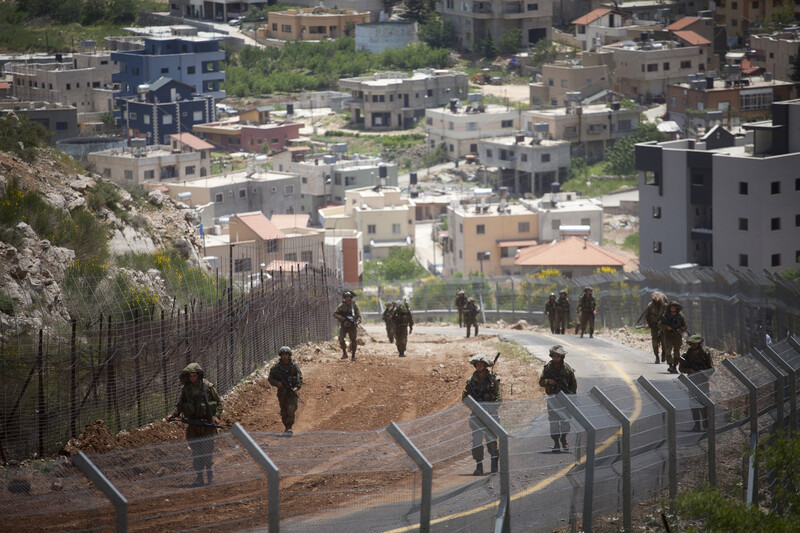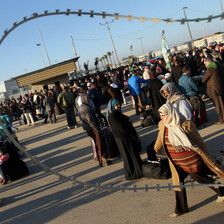The Electronic Intifada Masade 11 August 2014

Six Syrian villages remain standing in the Golan Heights, occupied by Israel since 1967.
ActiveStillsTamara Halabi has spent her whole life living under Israeli rule in her hometown of Masade, one of the six Syrian villages still standing in the occupied Golan Heights.
Local residents’ historic refusal to accept Israeli citizenship and normalize the Israeli occupation did not stop a Zionist organization from attempting to get Halabi and others to participate in civil service.
Civil service is a state-run volunteering program aimed at individuals otherwise exempt from compulsory military service, participation in which conditions equal access to education and the job market.
“We reject civil service because it is a way for Israel to pressure us to give up our Syrian Arab identity and culture,” Halabi, 19, told The Electronic Intifada.
Israel has maintained its occupation of the Golan Heights after capturing it in June 1967. The 130,000 people expelled by Israel that year have now swelled to at least 433,000 displaced Golan natives living elsewhere in Syria, according to “Breaking Down the Fence,” a 2010 publication by Al-Marsad, a human rights group that works in the Golan.
Today an estimated 23,000 Syrian Arabs — the majority of whom are from the Druze religious community — live under Israeli military occupation in six villages across the Golan.
The indigenous Syrian residents of the Golan have historically refrained from working in Israeli institutions. Yet according to local activists, at least eleven Syrians in 2013 from the Golan Heights were tricked into registering for civil service through the auspices of Aminadav, a Zionist group that promotes civil service among communities that do not serve in Israel’s occupation army. They later dropped out of the program.
A report published earlier this year by Baladna, a Haifa-based Palestinian advocacy group, confirms that eleven Syrians registered in 2013 for civic service.
As the Golan Heights grows increasingly divided over the ongoing violence in Syria, local activists accuse Israel of seizing the opportunity to strengthen its occupation while the world’s attention is elsewhere.
During her final semester of her senior year in high school in the spring of 2013, Tamara Halabi and her sister were approached by Hajali as-Safadi and Aadna al-Wili, who concealed their identities as Aminadav recruiters.
“Too good to be true”
In addition to her and her sister, Halabi says approximately thirty other classmates were also targeted for recruitment. As-Safadi told Halabi and others that a new program called Helping the Hometown (Musaadet al-Balad in Arabic) included recent graduates spending a year volunteering in schools, hospitals and other places in exchange for university scholarships and stipends for living costs.
Due to Israel’s restrictions and isolation of the occupied Golan Heights, as well as its promotion of Jewish-only settlements, indigenous residents suffer from a lack of economic infrastructure and opportunities. For impoverished families, the prospect of free education is appealing.
“I told her that I wanted to participate, but I wanted to understand the benefit [for Aminadav],” Halabi recounted. “After a while, my sister and I became suspicious because [the recruiters] aren’t from our village — and it’s not logical that it’s in their interest to help our hometown.”
“It sounded too good to be true,” she added.
After Halabi consulted relatives, she requested help from Aamer Ibrahim, an activist based in Majdal Shams, a Druze town in the northern Golan Heights. Ibrahim campaigns against attempts by Israel and its supporters to normalize the occupation by promoting cooperation between Israeli Jews and Arabs without addressing structural injustice.
“Sell your morals”
“Little by little we started to understand that it wasn’t volunteering for the village or helping the village; it was civil service … to give up your identity, to sell your ideals and morals,” Halabi said.
After Ibrahim searched the name of the recruiter online in Hebrew, he found that she works for Aminadav, whose website says it was “founded in the spirit of religious Zionism.”
Aminadav’s “about us” page explains that the organization recruits for civil service among orthodox religious Jewish and Palestinian communities — both historically exempt from compulsory military and civil service.
Ibrahim subsequently telephoned Aadna al-Wili, one of the managers of the branch responsible for recruiting in the northern region of present-day Israel and the occupied Golan.
Al-Wili grew suspicious of Ibrahim’s voice and said he sounded too old to participate in the program. “She said it’s [for people aged] between 17 and 21,” Ibrahim told The Electronic Intifada. “So I told her I am asking on behalf of my little brother. Then she began to describe the project and she didn’t use the words ‘civil service.’”
When Ibrahim asked her directly if the project involved civil service, she denied that it did. “It was clear that she was lying at this point,” Ibrahim recalled.
Speaking to The Electronic Intifada by telephone, al-Wili confirmed a civic service program in Aminadav working in many Palestinian communities in present-day Israel. When asked about their work in the occupied Golan Heights, however, she replied: “I am not required to answer that question and I refuse to answer.”
Tax exemptions
Ibrahim’s suspicions were vindicated by Sahar Vardi of New Profile, a group that monitors the militarization of Israeli society and supports conscientious objectors. She explained that organizations like Aminadav work under the auspices of “the national civil service secretary” and “are registered as nonprofits and receive tax exemptions.”
“These NGOs [nongovernmental organizations] are in a way implementing the agency of national service,” Vardi told The Electronic Intifada by email. “They are responsible for finding volunteers and matching them with volunteer opportunities, as well as training and preparing these volunteers.”
Organizations that promote civil service “get a budget from the [science and technology] ministry to pay volunteers and provide them with housing,” Vardi said.
Local residents say they reject cooperation with Israeli governmental institutions.
After the news spread that the program was part of an Israeli plan to recruit Syrians into civil service, the Aminadav recruiters canceled a meeting that had been scheduled for participants and their parents.
All of the estimated thirty people dropped out when they learned that it was a civil service recruitment attempt.
Ibrahim explains that the plan “is a step towards eventually promoting service” in the Israeli military, which for decades has occupied Palestinian, Syrian and Lebanese lands in violation of international law.
Ibrahim believes that Israel wants to “tokenize” Syrians from the occupied Golan Heights as it has done with Druze Palestinians and some Palestinian Bedouins who serve in the military.
“Exploiting suffering”
“In my opinion, there is a direct link” between what is happening in Syria today and the timing of this program, added Ibrahim. “The [Israeli authorities] wanted to do such a project before but the circumstances didn’t allow it.”
As natives of the Golan Heights grew more divided over whether or not they should support Bashar al-Assad’s regime in Damascus, Israel increased its efforts to strengthen the institutions of occupation in the Golan.
As of July 2013 – the last time the United Nations updated its death toll in Syria – more than 100,000 people were estimated to have been killed since the uprising against Assad broke out in March 2011.
Ibrahim accused Israel of “exploiting Syrian suffering” by attempting to install a civil service program, further expanding its Jewish-only settlements and simultaneously increasing its exploitation of natural resources in the occupied territory.
In February 2013, Israel awarded a contract to a subsidiary of former US Vice President Dick Cheney’s Genie Energy company, permitting the group to explore for oil and natural gas in a 150-square-mile area of the Golan Heights. Cheney, one of the chief architects of the disastrous 2003 American war on Iraq, will serve as an adviser for the exploration of the occupied territory.
According to the Al-Monitor website, some 4,000 Israelis moved into Jewish-only settlements in the Golan Heights over the course of the five years prior to October 2012. Settlements and Israeli industrial zones were both expanded during that period.
Locals say those numbers have continued to increase since the violence in Syria worsened.
Taiseer Maray, a doctor from Majdal Shams, began an organization to raise awareness about Israel’s recent attempts to further the colonization of the Golan Heights. Israel “had been waiting for an opportunity” to strengthen its occupation, such as when the world is focused on bloodshed in Syria and other places in the region, he told The Electronic Intifada.
“It is a colonial state,” he said. “This is expected.”
Aamer Ibrahim, Sawsan Khalife’ and Irene Nasser contributed translation and research in Hebrew.
Patrick O. Strickland is an independent journalist and regular contributor to Al Jazeera English, AlterNet and The Electronic Intifada. His website is www.postrickland.com. Follow him on Twitter @P_Strickland_





